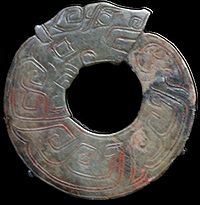Difference between revisions of "Template:Oroboros picture of the month"
From Bioblast
Beno Marija (talk | contribs) |
Beno Marija (talk | contribs) |
||
| Line 8: | Line 8: | ||
{| | {| | ||
| | | | ||
[[File: | [[File:Mountain at Shanghai Museum.jpg|200px|Oroboros of the month]] | ||
| ''' Ouroboros | | ''' Jade Ouroboros, Shang Dynasty, by Mountain at Shanghai Museum ''' | ||
:Dr. Vyacheslav Kalchenko, who sent the picture of the Jade Ouroboros, Shang Dynasty, by Mountain at Shanghai Museum (right) | |||
:brought the following reference to the attention of Bioblast: '''[[Mahdihassan 1989 Am J Chin Med]] ''' | |||
:It compares the Yin-Yang, the Chinese symbol of creation, with the Ouroboros in the Greek alchemy | |||
:Published in ''Am J Chin Med 17:95-8'' by [[Mahdihassan S]] in 1989 | |||
|} | |} | ||
Revision as of 14:27, 1 October 2019
Jade Ouroboros, Shang Dynasty, by Mountain at Shanghai Museum
|
